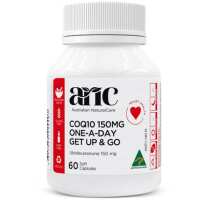
CoQ10 is important for the production of cellular energy. It is an antioxidant that supports healthy heart and cardiovascular system function.
Coenzyme Q10, or CoQ10 for short, is an essential part of the mitochondria, the ‘powerhouse’ or energy producing unit of our body cells. This means it is required for the production of cellular energy. CoQ10 is also involved in the manufacture of a molecule called adenosine-triphosphate, or ATP, which is the energy currency for all our body processes.
As an antioxidant, CoQ10 helps neutralise free radicals and inhibits their ability to cause the cellular damage that can lead to health problems over time.
CoQ10 150mg may be particularly beneficial for older people because the body's own level of coenzyme Q10 diminish with age. It may also help active people meet the heart and skeletal muscles' cellular energy demands during physical activity.
Key Features
✓ Supports general health and wellbeing✓ Antioxidant that helps reduce free radical damage to body cells✓ Supports healthy cardiovascular system function and heart health✓ Maintains and supports energy levels
Dosage
Take 1 capsule daily with a meal, or as advised by your healthcare professional.
Ingredients
Each soft capsule contains:
Ubidecarenone (coenzyme Q10) ......................................................................... 150mg
Contains Soya bean products, pollen, sulfites, phenylalanine.
This product is gluten free & lactose free.
FAQs
What is CoQ10?
CoQ10 is a fat-soluble, vitamin-like compound that is also know as ubiquinone and ubidecarenone. It takes its name from its chemical structure, which is comprised of a group of elements bonded together to form a structure called a quinone, plus a side chain of 10 parts.
How is CoQ10 involved with energy?
CoQ10 is essential for the production of cellular energy, a process that occurs in the mitochondria of the cells and results in the manufacture of a compound called adenosine triphosphate (ATP), which is the energy currency for all the body's processes.
Due to its central role in cellular energy production, CoQ10 is found in large amounts in organs and tissues that have a high metabolic rate, like the heart, muscles and liver.
CoQ10 is also active in cell membranes, where it assists in the transfer of energy and oxygen between the blood and the cells.
When is the best time of the day to take CoQ10?
As CoQ10 supports energy, we recommend taking it with breakfast or lunch. It's best to take your CoQ10 supplement with food.
How much CoQ10 should I take?
For most healthy people a suitable dose of CoQ10 is 150mg per day, take either in three doses of 50mg or a single dose of 150mg, unless advised otherwise by your healthcare professional. If you're taking precribed medications though, please talk to either your doctor or one of our naturopaths before you start. Do not take CoQ10 while on warfarin therapy without medical advice.
Why do you use the Ubidecarenone form rather than Ubiquinol?
Both Ubidecarenone and Ubiquinol forms of CoQ10 offer benefits to the body, however the body needs to undergo an extra step to be able to use ubidecarenone effectively. Ubidecarenone is also a more economical option for our customers.
Is the formula vegan?
Our CoQ10 is not suitable for vegans or vegetarians.

